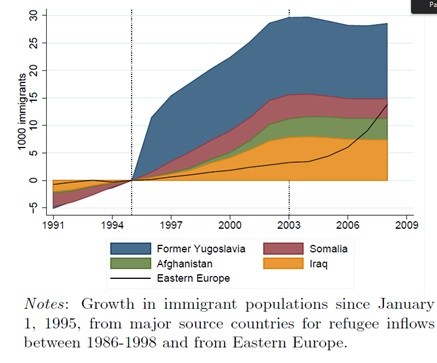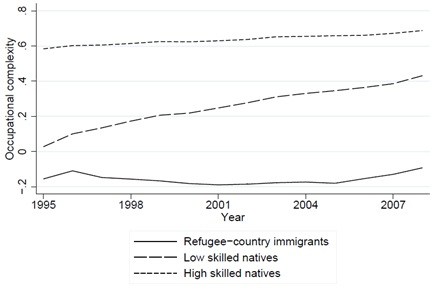In the face of increasing migrant flows, public discourse often focuses on the perceived negative effects on the native population. But do less educated immigrants really displace similarly skilled native workers? Or do they rather complement native skills, thus stimulating natives’ specialization and increasing their job opportunities and wages? A recent New York Times article seeks to debunk the myth of “job-stealing” immigrants. It cites research by various IZA network members including Giovanni Peri (University of California, Davis), one of the leading experts on this topic.
In a new IZA Discussion Paper, Mette Foged and Giovanni Peri examine the labor market outcomes of low-skilled natives in response to massive inflows of immigrants to Denmark during the period 1991-2008. The inflow, mainly caused by refugees from Former Yugoslavia, Somalia, Afghanistan and Iraq, consisted of mostly low-skilled workers, who were distributed across Danish municipalities through a centralized program. This administered distribution of immigrants provides a “natural experiment” to assess the impact of immigration on native labor market success.

Natives benefit from occupational upgrading and specialization
The findings suggest an occupational upgrading and specialization of natives in the face of immigrant inflows. While immigrants are initially restricted to occupations and jobs consisting of manual tasks due to their language problems, natives leave these jobs by specializing in more complex jobs with a primarily interactive task content. Accordingly, immigration increased native low-skilled wages and mobility. Contrary to popular belief, but in line with previous research, the study does not find an increase in the probability of unemployment for unskilled natives.

A geographically wider approach was applied by Peri in joint work with Cristina Cattaneo and Carlo V. Fiorio in their paper “Immigration and careers of European workers: effects and the role of policies” (published in the IZA Journal of European Labor Studies), which examined the effect of immigrants on the career of natives using data from eleven European countries. They found that in countries and occupations with larger immigrant competition, natives are pushed to faster occupational upgrades towards jobs using more sophisticated skills, requiring higher education and paying higher wages.
Natives are also more likely to undertake entrepreneurial activities in response to larger immigrant competition. This implies that immigrants “push up” natives in the labor market, and the overall effect on wages and income of natives is small and usually positive. While some natives may still be crowded out, new job opportunities are created at the same time as foreigners take jobs complementary to those of natives.
No negative effects on wages and job opportunities
These articles enrich an already extensive literature on the effect of immigration on native wages, which Peri has summarized in his IZA World of Labor article “Do immigrant workers depress the wages of native workers?”. It is based on a review of 27 original studies published between 1982 and 2013. Most of these studies for industrialized countries have found, on average, no effect on the wages of native workers. To understand the impact of immigrant workers on wages, immigration and the response of firms and workers must be analyzed together. Such studies show that native workers’ wages have been insulated by differences in skills between native and immigrant workers, adjustments in local demand and technology, expansion of production, and specialization of native workers in response to rising immigration.
The implications of Peri’s findings are that immigrants do not hurt, but may even improve, native labor market opportunities by filling manual and less-skilled occupations. More open immigration policies, combined with flexible labor markets, could thus result in better career opportunities for natives. Overall, the fear of immigrants “stealing” native jobs is clearly unjustified.
Evidence from Syrian refugees in Turkey
This also applies to refugee flows, as another recent IZA Discussion Paper shows for the local economy of southeast Turkey. While the massive influx of refugees from Syria increased food prices and – to a lesser degree – housing prices, the labor market appears unaffected in the regions bordering Syria. This can only partially be explained by Turks moving away from the Syrian border as there are far more refugees arriving than residents leaving the region.